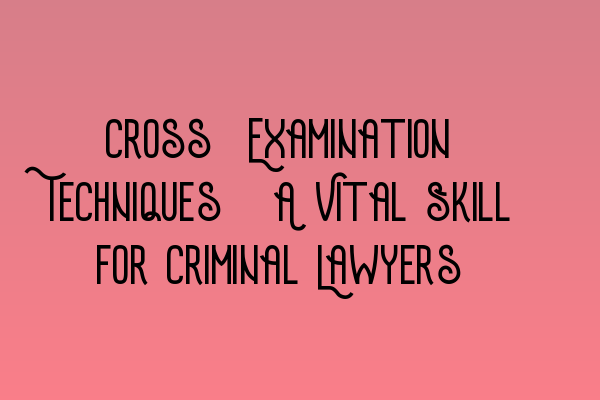Cross-Examination Techniques: A Vital Skill for Criminal Lawyers
As a criminal lawyer, mastering the art of cross-examination is essential for your success in the courtroom. Cross-examination is a valuable tool that allows you to challenge the credibility and consistency of witnesses, expose contradictions, and undermine the prosecution’s case. In this article, we will explore some effective cross-examination techniques that every criminal lawyer should master.
1. Plan and Prepare
Before entering the courtroom, thorough planning and preparation are key. Familiarize yourself with the case, witness statements, and any available evidence. By understanding the details of the case, you can devise a strategic approach to cross-examination that challenges the weaknesses of the prosecution’s case.
Utilize SQE 1 Practice Exam Questions to test and hone your knowledge of criminal law and the rules of evidence. These resources provide a comprehensive understanding of the legal frameworks and principles that underpin effective cross-examination techniques. Additionally, SQE 1 Practice Mocks FLK1 FLK2 offer valuable simulated scenarios that allow you to practice your cross-examination skills in a realistic setting.
2. Establish Rapport and Control
When cross-examining a witness, it is crucial to establish rapport and gain control of the courtroom. Begin by asking introductory questions that are easy to answer and build a rapport with the witness. This helps to create a more relaxed environment and may encourage the witness to provide more candid responses.
However, be prepared for hostile witnesses or witnesses who are resistant to answering your questions. Maintaining control of the courtroom through assertive questioning and confident body language is essential in managing difficult witnesses.
3. Use Leading Questions
One of the most effective cross-examination techniques is the use of leading questions. Leading questions are phrased in a way that guides the witness towards a specific answer, often a ‘yes’ or ‘no’ response. By using leading questions, you can lead the witness to admit facts that are favorable to your client’s case and undermine the prosecution’s narrative.
For instance, if the prosecution’s case relies on a witness’s identification, you can use leading questions to challenge the witness’s ability to accurately identify the defendant. By asking questions such as “Isn’t it true that the lighting conditions were poor?” or “Would you agree that you only saw the defendant for a brief moment?” you can plant doubt in the reliability of the witness’s identification.
4. Uncover Inconsistencies and Contradictions
Another essential technique for effective cross-examination is uncovering inconsistencies and contradictions in the witness’s testimony. Scrutinize the witness’s previous statements and compare them with their testimony in court. Look for any discrepancies, changes in details, or contradictions that can be used to undermine the witness’s credibility.
By using SQE 2 Preparation Courses, you can further enhance your ability to analyze evidence and identify inconsistencies. These courses provide comprehensive training on evidence analysis and the skills necessary to effectively cross-examine witnesses. The SQE 1 Preparation Courses also offer valuable insights into legal research and case preparation, which contribute to your overall performance as a criminal lawyer.
5. Maintain Composure and Objectivity
During cross-examination, it is crucial to maintain composure and objectivity. Avoid getting emotionally charged or argumentative with the witness, as this can undermine your credibility and professionalism. Instead, focus on presenting your case and exposing the weaknesses in the prosecution’s evidence through skillful questioning and evidence analysis.
Remember, cross-examination is an opportunity to challenge the prosecution’s case, expose inconsistencies, and highlight the weaknesses in the witness’s testimony. By mastering the art of cross-examination, you can effectively advocate for your client and increase the chances of a successful outcome.
Stay updated with the SRA SQE Exam Dates to ensure you are well-prepared for the licensing exams. The SQE exams are designed to assess your competence as a criminal lawyer, including your cross-examination skills.
In conclusion, cross-examination is a vital skill for criminal lawyers. With careful planning, effective use of leading questions, uncovering inconsistencies, and maintaining composure, you can strategically challenge the prosecution’s case and advocate for your client. Continuously improving your cross-examination techniques through practice and training, such as SQE 1 Practice Exam Questions and SQE 2 Preparation Courses, will enhance your effectiveness in the courtroom. Embrace the art of cross-examination and elevate your skills as a criminal lawyer.
